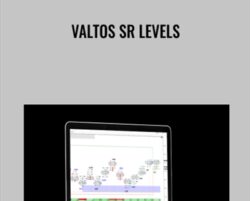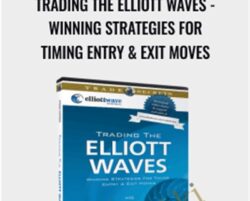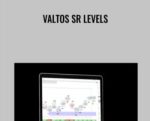Introducing Valtos SR Levels…Imagine being able to draw a support or resistance level as soon as it happens based on the order flow instead of drawing a support or resistance level AFTER the market has traded a level 2 or 3 times???With Valtos SR Levels, your problems of determining Support and Resistance levels are now solved!Watch this 27 minute video to learn more.. Hi. It’s Michael Valtos from Orderflows.com and I have been trading for over 20 years. Over time I have tried so many different ways to analyze the market than I care to remember. But one of the techniques that has always held true is support and resistance.When I first started trading with order flow I used it to determine support and resistance levels in the market and I still do to this day.Get Valtos SR Levels – Anonymous , Only Price $87Know support and resistance levels as soon as they appear and NOT on the first test or the second test. What does that mean? “Know support and resistance levels as soon as the they appear?” If you can get a clue on how price may react when it get back a level, then you are so far ahead of other traders who are sitting around waiting for price to come back to that level and then react. You can have your order already waiting to take advantage of the trading opportunity rather than sitting around waiting for it to come back to confirm a support or resistance level.You will miss the trading opportunity. Know support and resistance levels not on the first test or the second test. Know the level at the first time. Then you can take advantage of support or resistance on the retest.With Valtos SR Levels you will know that at Point A there is resistant selling so you can get short at Point B or Point C.If you have ever watched people try to explain support and resistance they show you pretty bar charts.”Oh price traded here once, twice, three times so now you have support. And price traded up here once, twice now you have resistance.”One of the best books on technical analysis is the book titled “Technical Analysis Of Stock Trends” by Robert Edwards and John Magee. It the book support is defined as buying in sufficient volume to prevent and further downward movement in price for an appreciable period. Resistance is selling, the opposite of buying in sufficient volume to satisfy all the buyers and prevent prices from going higher.A support level is a price area where buyers are willing to step in and buy enough contracts to temporarily stop and often times reverse a downtrend.A resistance level is a price area where sellers are willing to sell enough contracts to temporarily stop and possibly reverse and uptrend.If you are drawing support and price levels without using volume then you just dont know if it is really support or resistance.When you trade with order flow you are analyzing the volume traded on the bid and the volume traded on the offer. Over time you know that when strong bids appear that absorb all the selling and the market rallies is often bullish for the market. That is supportive buying.When you see strong offers appear that absorb all the buyers at that level until the buyers have no more bullets left and the market starts to drop that is bearish for the market. That is resistant selling.If you are drawing support and price levels without using volume then you just can’t be sure if it is really support or resistance.When you trade with order flow you are analyzing the volume traded on the bid and the volume traded on the offer. Over time you know that when strong bids appear that absorb all the selling and the market rallies is often bullish for the market. That is supportive buying.When you see strong offers appear that absorb all the buyers at that level until the buyers have no more bullets left and the market starts to drop that is bearish for the market. That is resistant selling.Now let me ask you…which method do you think is better? Drawing a “support” level because price traded there 2 or 3 times? Or drawing a support level based on the volume that just traded?Let’s Not Kid Ourselves…Most traders draw support and resistance levels incorrectly.Most traders draw support and resistance levels as areas where the market has touched a level a few times.How can you honestly say a level is support if you don’t analyze the volume traded there?How can you honestly say a level is resistance if you don’t analyze the volume traded there?Do you like what you see so far? Then don’t wait any longer and get Valtos SR Levels Now.If you think volume doesn’t matter in determining support and resistance…think again.When you analyze the market based on order flow you make decisions mainly based on the volume traded and how it trades.Don’t treat all price levels the same. That is the fatal flaw with most indicators – they treat all prices the same. Imagine the market is rallying, hits a high area and starts falling. Do you think the high has a stronger chance of holding if you knew 2000 contracts traded at the high as opposed to trading on 15 contracts? Chances are the high where 2000 contracts traded would be a stronger high with a better chance of holding if price retested it because there are willing sellers absorbing all the buying.Valtos SR Levels allows you to add a volume threshold filter where you can set a minimum volume traded amount for the tool to trigger a buy or sell level.Here is a chart with the volume threshold set to 0 which means that it will show every trigger without regards to volume:Here is a chart with the volume threshold set to 500 which means that the bar would have to trade at least 500 contracts for a trigger to show:You can clean up your charts a bit and get signals only when there is solid volume traded.Bars that don’t trade enough volume are ignored. Let me give you an example of where this can be useful – Trading minute based charts in the evening or early morning session when you get bars with small volume. We all know there are time when the market is not very liquid so you might want to actually not take a signal during that time. If you have ever traded ES or ZB you know the time from 11pm to 1am Chicago time is dreadfully slow in the markets and the market doesn’t move more than just a couple of ticks over that 2 hour period. If you are trading a minute based chart, bars would be forming but with thin volume, so you probably would not want to take any trades during slow periods.Remember the basic definition of support: A support level is a price area where buyers are willing to step in and buy enough contracts to temporarily stop and often times reverse a downtrend. You need volume to appear in the form of buying to absorb all the selling and support the market from declining further.Remember the basic definition of resistance: A resistance level is a price area where sellers are willing to sell enough contracts to temporarily stop and possibly reverse and uptrend. You need sellers in volume to appear and absorb all the buying until the buyers are out of bullets and can’t buy anymore and stop the market from rallying further.The 3 ways I trade with Valtos SR Levels:(I am sure you can expand on these methods)1) Trade the signal as soon as it appears for reversals.Set the lookback period to ‘True’ and choose a time period of at least ‘9’.The longer the time period the further it looks back to the left.2) Trade the signal as soon as it appears in trends.Set the lookback period to ‘False’. No need to adjust the time period becauseit will ignore the lookback period.If you are trading minute based charts, you might want to consider using the ‘Volume Threshold’ filter to eliminate signals on bars with thin volume.3) Trade the signal on a retest.I find it best to use the same settings as the reversal trade.Set the lookback period to ‘True’ and choose a time period of at least ‘9’.The longer the time period the further it looks back to the left.You should have noticed by now that when Valtos SR Levels indicates a buy with an up arrow or a sell with a down arrow that there is also a blue zone drawn with the buy arrow or a red zone with a sell arrow. This is the area where you would place your limit order for entry.Do you like what you see so far?When you use the “Volume Threshold” to filter out bars with thin volume in your analysis that opens up another set up trading opportunities.Managing your risk is just as important as finding the trade opportunity. Valtos SR Levels makes it visually easy to determine where you place your stop. Every trade you take whether it is will the Valtos SR Levels or your own trading method should have a stop.You should have noticed by now that when Valtos SR Levels indicates a buy with an up arrow or a sell with a down arrow that there is also a blue zone drawn with the buy arrow or a red zone with a sell arrow. This is the area where once it is breached you should be getting out. So if the market is trading below the blue zone, the reason for being long is no longer there – get out of the trade. The same is true for a red sell zone, if the market is trading above the red sell zone – get out of the trade and look for the next trade.Trading is like having a grocery store. If you sell just one item you won’t be very successful. Just as if you are just trading one trade setup. With Valtos SR Levels you can trade reversals, trends and range bound markets.Valtos SR Levels should make trading support and resistance easier for you to trade around.Do You Trade On A Normal Bar Or Candle Stick Chart?I Got You Covered…Valtos SR Levels runs on a normal or candlestick chart also!Support Becomes ResistanceSound Alert Feature I have added in a sound alert feature so you won’t miss another trade!Although I don’t use sound alerts, mainly because I trade many different markets on different time frames, many traders have requested having sound added to my tools. But for those of you who trade just a few markets, then you will benefit immensely from the sound feature.Best of all, the sound feature can be turned on if you want to use it or you can turn it off if you don’t want to use it.Get Valtos SR Levels – Anonymous , Only Price $87Tag: Valtos SR Levels Review. Valtos SR Levels download. Valtos SR Levels discount.







